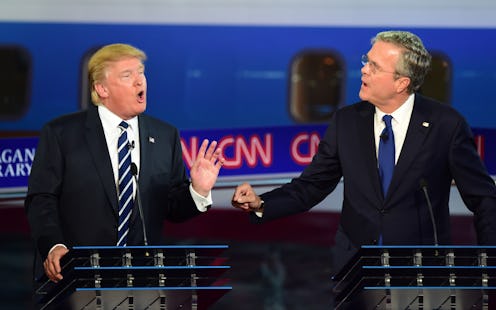News
Republicans Are Now Debating About Debates
The Republican presidential candidates agree: The last primary debate was a disaster, and any future debates must adhere to certain guidelines. What they can't agree on is what exactly those guidelines should look like. All but a few of the candidates' campaigns met over the weekend to draft a new list of debate demands, only to find that many were directly at odds with one another. However, this episode highlights more than just the candidates' bickering. It shows that the national GOP is losing control of the primary process.
A quick recap, because this has moved very quickly: The Republican candidates hated the last primary debate because they believed that CNBC's questions were unfair. Shortly after the forum, several campaigns met with one another to develop a plan for wresting control of the debate process away from the Republican National Committee and into the hands of the candidates themselves. Right after this happened, RNC Chief Reince Priebus announced it would be suspending its relationship with NBC, the parent company of CNBC, over perceived shortcomings of the CNBC moderators.
This was most likely a preemptive attempt by Priebus to convince the candidates that, hey, the party has your back! But it apparently didn't work, because now, 13 of the Republican candidates are appealing directly to the TV networks with a list of demands for future debates. They've agreed on some things already; for example, they don't want any lightning rounds, candidate-to-candidate questioning or questions that require the candidates to raise their hands. They agreed on the need for opening and closing statements and would like the networks to refrain from displaying "behind shots of the candidates showing their notes."
But there's a whole lot of disagreement as well. For example, Bobby Jindal and Lindsey Graham want there to be more debates with more candidates. Ben Carson agrees that there should be more candidates, but he wants fewer debates. Donald Trump, meanwhile, wants there to be as few candidates on stage as possible and absolutely doesn't want any of the debates to go over two hours. Complicating matters is the fact that Trump, just hours after meeting with the rest of the candidates, announced that he'd be negotiating one-on-one with the TV networks over the debate format, thus throwing into doubt the candidates' otherwise-unified front.
The real takeaway here, though, has nothing to do with the Republican candidates' quibbling over debate protocol. What's far more significant is the fact that the candidates themselves, in doing this, are effectively cutting the national Republican Party out of the entire debate-planning process. As a result, the RNC is losing of a whole lot of power over how the Republican primaries proceed. Ironically, this is partially the RNC's fault.
In the 2012 cycle, there were 20 Republican primary debates. Just about everyone in the GOP agreed that this caused more harm than good, as it resulted in moments like Mitt Romney's "self-deportation" gaffe. After the election, the RNC drastically overhauled its debate rules in an attempt to mitigate the damage in 2016. The new guidelines limited the number of officially sanctioned debates and imposed penalties for candidates who took part in non-sanctioned debates.
It's now clear that this plan has backfired spectacularly. After all, the RNC did approve of the CNBC forum before it took place — and that debate ended up infuriating conservatives and Republicans across the board. Now, the Republican candidates openly distrust the RNC's ability to manage the debates and are taking matters into their own hands. Priebus, for his part, is publicly praising the candidates' decision to do so (which makes sense, because he's not going to openly oppose his own party's presidential candidates).
Presidential primary debates are a relatively recent phenomenon in American politics. The press, the candidates, and the national parties are still figuring out the best way to manage them, and this little dust-up is a part of the process. But it's becoming clear that a top-down model, wherein the head of the Republican Party unilaterally dictates the debate format to the candidates, isn't going to fly.
